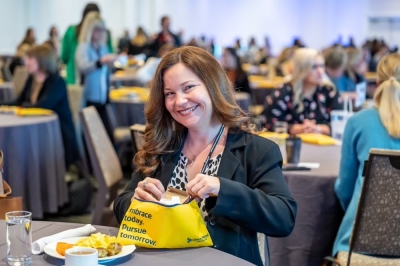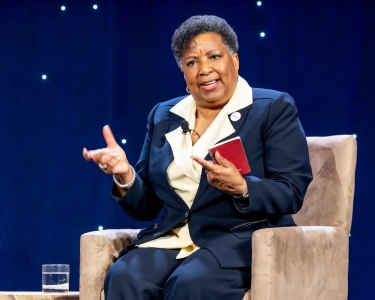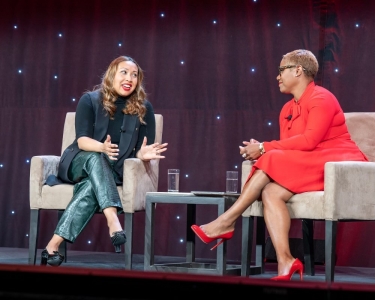WEBINAR: This webinar explores how to measure and communicate your organization's social impact with proven frameworks and strategies that matter to stakeholders.
2022 Corporate Citizenship Conference Day 2 - Morning: Building bolder communities of caring

Today marks the first full day of the 2022 International Corporate Citizenship Conference in Boston, hosted by the Boston College Center for Corporate Citizenship.
This morning, attendees looked forward to building on the big ideas of last evening’s uplifting opening session, which revealed the winners of the first annual Corporate Citizenship Innovation Awards, presented by Weil, Gotshal & Manges LLP. Today, participants jumped into a day filled to the brim with topical general sessions, plentiful opportunities to connect with colleagues, and practical panels, workshops, and case study sessions from which to learn.
Connection making, sustainability, and accessibility
Attendees began the day with an Idea Exchange Breakfast, which provided structured networking opportunities for attendees to connect on relevant topics from corporate giving to net zero. The boisterous meal provided a fitting entrée to the many big ideas the day would bring.
To kick off the first session, BCCCC Executive Director Katherine V. Smith officially welcomed the crowd, thanking the event sponsors who make this event possible. A generous investment from carbon-offset sponsor UPS has allowed BCCCC to offset more than double the carbon emissions of this in-person event, in addition to the virtual event held the previous month. Thanks to zero-waste sponsor General Motors, leftover food at the in-person conference will be donated as deemed safe by the city of Boston, all materials used will be recycled and/or recyclable, and event water use has been offset to account for double the impact of the entire in-person conference.

Additionally two more sponsors are helping to make the event as inclusive as possible. TJX, inclusion sponsor, supported the conference’s annual Inclusion Fellowships, and Toyota sponsored accessibility enhancements throughout the event.
Great corporate citizenship demonstrates CARE
Smith discussed the findings of the recently published State of Corporate Citizenship survey exploring the perspectives of non-CSR executives. Conducted for more than 20 years, the survey provides a longitudinal look at how to practice of CSR has evolved.
The survey results find that there are four practices that CSR professionals can adopt that, when put into practice, benefit not only the community but also the company:
· CHOOSE the issues that your company is best-positioned to address.
· ALIGN corporate citizenship with business strategy and interdepartmental goals.
· REINFORCE corporate citizenship investments over the long term.
· EXPLAIN your positions on the issues your stakeholders care about.
By showing stakeholders they CARE, corporate citizenship professionals are better equipped to prepare and respond to the disruptions we face today in modern business. “The great news for the field is that corporate citizenship is actually now an imperative. Your work is so critically important to making the world a better place,” said Smith. “We have many reasons we might be discouraged, but I continue to be optimistic. I thank you and am inspired by your hard work.”
Brighter, bolder, better employee engagement programs
With this, attendees looked forward to the opening session from convening sponsor Liberty Mutual, “Liberty Torchbearers: Creating a bolder community of caring.” Melissa MacDonnell, president of Liberty Mutual Foundation and vice president at Liberty Mutual, took the stage to introduce the topic at hand. MacDonnell explained that over the past five years, Liberty Mutual has expanded its community engagement from two episodic campaigns for employee giving and corporate service days to a year-round comprehensive giving, service, and volunteer program with global impact called Liberty Torchbearers.
“While these two programs were obviously extremely successful and heavily utilized, they didn't reflect the broader cultural statement we were trying to make for employees,” said MacDonnell. “The new model is a more cohesive and comprehensive way of showing what we stand for as a company, elevating the idea of what it means to be a Liberty Torchbearer.”
MacDonnell introduced a cross-functional team to discuss Liberty Mutual’s innovative program that combines the best aspects of community involvement and employee engagement. Joining her on the stage were colleagues: Sylvia Stevens-Edouard, senior director of community relations; Trish Gillis, director of promotional operations; Jazmine Ramirez, senior program manager; Patricia Mayers, assistant director of global diversity, equity, and inclusion strategy, entities, and partnerships; and Courtney Quinn, vice president of brand strategy.
Stevens-Edouard, who was instrumental in the creation of the program, commented on how Liberty Torchbearers helps employees make connections—with each other and to the company. “We want to help employees see that their volunteer work is important for Liberty, but also that Liberty values the job they’re doing for the community,” said Stevens-Edouard. “We've created a culture that says it's OK to rearrange your schedule so you can give back. That's what helps an employee stay in a job.”
To be successful, the architects of the new program made an effort to get buy-in, both internally and externally, from industry peers and community partners, to senior leaders, other departments, and employees. “Employees have the opportunity to engage using an à la carte menu to participate in and promote programs,” said Gillis. “In the future state, this should just become part of their normal work.”
To this point, skills and purpose alignment was key for bringing employees on-board. “We need to help employees understand that their purpose aligns with the organizational purpose—that they can live their purpose at work, regardless of where they work,” said Ramirez. “We seek to strategically unlock the superpowers of our employees. Liberty Torchbearers provides synergy between the expertise of our team members and the expertise of our nonprofit partners.”
Torchbearers benefited from partnership with the brand team, which had an important learning curve. “It was really important to build the relationship between brand and community engagement—then we were able to have courageous conversations and ultimately produce a better outcome,” said Quinn. “Being able to talk externally about Torchbearers—as part of our authentic culture of purpose and community—is going to be really a powerful message for talent recruitment.”
Truly a cross-departmental effort, the community engagement team also makes a concerted effort to collaborate and meet regularly with the diversity, equity, and inclusion (DEI) team. “I was on-board immediately and the relationship with DEI has been close ever since. Our employee resource groups (ERGs) in particular have been instrumental in forging the Liberty Torchbearers program forward,” said Mayers. “If you have community engagement programs and have not had a conversation with the DEI team—please do so! It’s never too late.”
After the session closed, participants enjoyed opportunities to network with a break hosted by Gallagher and relaxed in the Vertex Conversation Lounge. Many attendees also chose to give back in an on-site volunteer project, in which they helped Ally build 500 financial education kits for students at the Manthala George, Jr. Global Studies School, a member of the local Brockton Public School system.
Then, participants rolled up their sleeves and engaged in the first round of breakout sessions, which included in-depth panel discussions covering ESG reporting, employee mental health, and other topics. They also dove into a case study, hosted by EY, to learn how to reimagine employee engagement in terms of corporate responsibility, purpose, and wellbeing.

Committing to racial equality in the long term
After an industry-focused lunch where attendees connected with colleagues in their sectors, they settled in to watch Bank of America’s lunchtime general session, titled “Catalyzing racial equality: The role of the private sector.”
Taking the stage was Ebony Thomas, racial equality and economic opportunity initiative program executive at Bank of America. Thomas discussed the bank’s commitment to advance racial equality and economic opportunity, a longstanding focus, which was accelerated in 2020. “The tragic death of George Floyd really highlighted the deep disparities that had already been known by communities of color, for all the world to see,” said Thomas. “Bank of America already had a commitment, on which we doubled down as a result of the tragedy.”
The bank deepened its efforts through a $1 billion commitment both in response to the tragic killings in communities across the country and the disproportionate impact of coronavirus on communities of color. In March 2021, the bank expanded this commitment to $1.25 billion over five years to further address these systemic issues. The investment—$450 million of which has already been made—includes philanthropy, sustainable finance through lending and investing, investments and deposits to community development financial institutions (CDFIs) and minority depository institutions (MDIs), hiring practices, development of financing solutions for small businesses, and more.
“This commitment is not performative—it’s what we do, and it’s who we are,” reinforced Thomas on behalf of Bank of America. “We share our success with our teammates and our communities. We’re very intentional about the work we’re trying to achieve.”
Thomas was joined by program partner Yasmin Cruz Ferrine, a key collaborator in operationalizing this investment and financing minority-owned entrepreneurs. Ferrine is general partner and co-founder of Visible Hands VC, a venture capital firm based in Boston with an accelerator investing in and mentoring diverse founders in the seed funding stages of their business.
Ferrine pointed out the huge disparities faced by entrepreneurs who are women and people of color. According to research, only 1% of funded startup founders are Black, and only 8% of funded founders are women. On average, white male founders receive more money in the critical seed funding stage when entrepreneurs need capital to grow their business idea. “Our rallying call was to provide meaningful capital at the early stages and connect entrepreneurs to a network of experts and advisors,” she said.
Bank of America was the first anchor investor for Visible Hands, recommended by the bank’s volunteer team focused on equity investment. According to Ferrine—also as a minority-owned firm—having an institutional partner such as Bank of America brought just the credibility they needed to gain traction.
“Very often with VCs, it’s not about investing in the business but the person,” Thomas noted. “When you don't see a representation of yourself in the investors on the other end, what impact does that have on the ability to get funding?”
“Bias comes from homophily—essentially, ‘birds of a feather flock together.’ VCs generally have the same mentality,” Ferrine responded. “This way, you are missing out on people with maverick backgrounds who did not necessarily take the traditional path to finance. Investors need to open up their aperture to find people from different backgrounds and paths.” Ferrine added that all the investors she works with receive unconscious bias training to address blind spots that are present within all of us.
Thomas concluded with a step back, reflecting on her company’s commitment to making systemic change, and how this work cannot be done in a vacuum. “Very often with this racial equality work, it's like a puzzle—we are all working on it separately without coming together,” she said. “Now we are creating more collaborations and massive public private partnerships that really have impactful meaningful change.”
With the conclusion of this thoughtful panel, attendees were on to afternoon activities and plenty more learning and networking at the Conference.
We’ll be blogging throughout the 2022 International Corporate Citizenship Conference to give you daily recaps and deep dives into the event’s unique content. Visit the Corporate Citizenship Perspectives Blog to follow along and recap the event.
Related Content
RESEARCH BRIEF - Researchers investigated how ESG activities help or hurt financial performance, using nine years of data from over 1,200 global companies.
RESEARCH BRIEF - Researchers analyzed 4 US energy exchange-traded funds (ETFs) over 15 years, including 2 dirty energy funds tracking fossil fuel companies and 2 clean energy funds tracking renewable energy companies.
RESEARCH BRIEF - Researchers conducted a survey, which measured perceptions of CSR and ethical leadership within the manufacturing and service industries.




